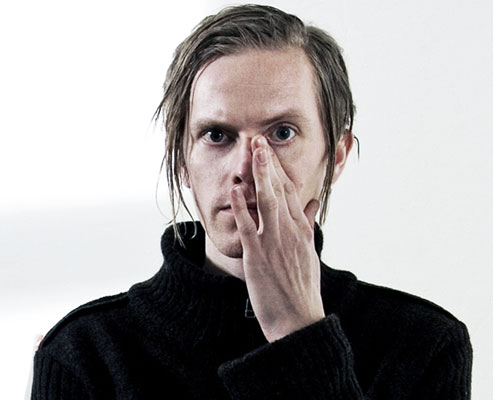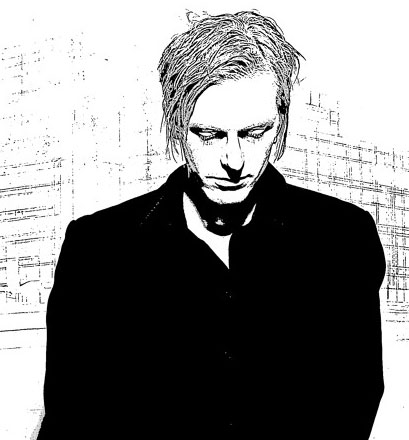OLIVER DOERELL

Electro-acoustic composer does 'fumbletronics'
by Michael Freerix
(June 2022)
Oliver Doerell is part of a scene of German 'fumbletronics,' who grew out of Berlin's early '90's squatting scene. He grew up in Brussels, playing guitar in a trio, writing traditional songs. But all that changed when he moved to Berlin. There, he became a musician and he created a career of his own, writing for ballet or radio-plays. Today he says: "I really can't do anything else."1 But with what he does, he merges together a lot of different streams in today's music, fusing electronics with field recordings and adds different instruments from all kinds of sources to his compositions. He sometimes invents instruments, which are barely sound machines, played with his fingers. He is an inventor and experimenter, but his music is soft and strong at the same time.
Born into a German family, Doerell grew up in Belgium. In the '80's the music scene centered around the Crammed Disc label, which became a source of inspiration for him. Located in Brussels, Crammed Disc was founded by Marc Hollander, who played in the bands Aksak Mabou and Honeymoon Killers. Singing mostly in French and influenced by rock, African vibes and French chanson, the ‚Honeymoon Killers' where quite successful in Belgium, Netherland and France. Besides his own music Crammed Disc, Hollander released a wide range of music, some African, some French, or even recordings by the Israeli band Minimal Compact or ex-pats Tuxedomoon, who had relocated from San Francisco to Brussels. The music on Crammed Disc sounded punkish, but despised the limitations of any particular style. It was a platform for music from all around the world.
In the early eighties, Brussels was a unique place. It was hardly damaged during the first and second World Wars, so the very old buildings there , many from mediaeval times and build beside small streets, create a very unique atmosphere. After the second World War, the European Union and NATO moved their headquarters to Brussels, so it turned into a growing city with international flair, and with international universities. On the other hand, you could find very cheap housing there too. Doerell describes it as "a dark city, quite poor and mysterious."2 In the '80's, many international artists moved there because the costs of living where quite low. It was a background from where small labels, based on a vibrant club scene, would emerge. "But all this has changed completely," says Doerell. "The last time I played in Brussels, I could not find a bar that would let me in after the gig," he explains. "Maybe because I was wearing make-up, and the drinks where super expensive!"3
Playing guitar, Doerell would listen to anything that Crammed released, and he would go to any show with bands that where coming to town. Guitar was his main instrument then, and songwriting his prime interest. But he had was curious about electronic music as well and bought primitive gear to make some music of his own in 1984. Soon, he joined a band that would play his songs. The band played a lot regionally, but never released any records, so their success was limited. They soon felt that living in Brussels limited their chance of becoming bigger, and in 1990, they relocated to Berlin, against Doerell's wishes. But Berlin was way more international, and with the Berlin Wall just coming down there, there were many places where all kinds of music was being played. The scene was open for experimentation, and that fit with Doerell's desire to expand and grow as a musician.
Living in a squat, he could concentrate solely on making music. "If this hadn't happen," he now says, "my life would be very different now."4 He bought more electronic equipment and focused on electronic experimentation, soon losing interest in his guitar. His band fell apart and he drifted away from writing songs, opening himself up to loose song structures. The Israeli band Minimal Compact, who had released their records on Crammed Disc, now seemed to serve as a road map: based on simple, often electronic, structures, they experimented with all kinds of sounds and instruments. Minimal Compact where still making rock music, but with a very alien vibe. And that was where Doerell was heading.
Living cheaply and working on his own, he developed a specific way of composing. "In the beginning, I fiddled around with sounds, loops. I recorded a lot without knowing where to go. There are a lot of beginnings and endings. Then I listened to my recordings every day and I started to improvise over them, adding sounds, reducing, changing tempos. I have a lot of instruments lying around that I can't play, but I can produce sounds from them. I use that a lot. And I built sound machines, little boxes with wire or strings, that make incredible sounds. I find that inspirational. Not to follow a melody, but to follow a sound, a noise. Alter a lot of the instrumental recordings, I try to make them fit, or work against each other. This goes on for a very long time. Every piece is always a new struggle from the beginning. [It] takes years since a track is finished."5 Doing this, he has created hours of recordings that have not found a way into a track. "I used to produce many recordings that where going nowhere, but now I seem to have more of a structure, or working pattern."6

The listening process is part of the entire composing process. He needs contemplation to find a moment in his recordings where his curiosity wants to make him dive deeper. :That is part of my composing, to listen and re-listen to recordings, contemplating on them, adding new sounds to them, re-listen then, finding a new edge."7 Doerell composes by letting things grow, letting them evolve out of themselves, and then focusing on edits, structure, speed, space. "I am an absolute autodidactic," he says of himself.8 But he has co-operators too, like the Persian percussionist Jawad Salkhordeh and saxophone player Roger Döring, whom he invites to improvise over almost finished tracks. "I create outlines, and invite people, to improvise over them. Then I focus on that without meeting the co-operators again. I work with what I get from them. They don't have any influence on the finished track."9
But there are certain streams in Doerell's oeuvre that he feels have a different feel to them. That's why he releases under different aliases like Cummi Flu, Dictaphone or Swod. "All these different projects have different focus points and workforce. I can categorize them easier this way, even if there are some correlations. A lot of it has to do with friendship, or soul-mating."10 Asked if he is looking for specially trained musicians to help him with finishing his tracks, he thinks a little and then responds, "You bump into people and share the same interests. And then I ask them to contribute to my stuff. It is as simple as that."11
REFERECES:
1. As quoted in a personal interview with the author, as broadcast at http://reboot.fm/2022/02/20/musical-drama-76-oliver-doerell/
2. As quoted in a personal e-mail to the author
3. Ibid.
4. As quoted in a personal interview with the author, as broadcast at http://reboot.fm/2022/02/20/musical-drama-76-oliver-doerell/
5. Ibid.
6. Ibid.
7. Ibid.
8. Ibid.
9. Ibid.
10. As quoted in a personal e-mail to the author
11. Ibid.